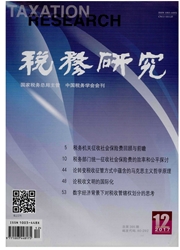

 中文摘要:
中文摘要:
本文就目前我国宏观税负是否过重、国家要不要通过减税帮助中小企业解困、减税能否刺激我国经济等税收热点问题提出了看法。认为:一国税负轻重,不能仅看宏观税负水平的高低,还必须结合该国政府的社会福利和社会保障等公共产品的提供水平;当前我国中小企业经营困难,主要不是由于税负过重造成的,因而其解困的良方也不应是减税;由于我国的具体国情,减税对刺激经济增长效果不会显著。在这种情况下,与其研究如何“减税”,不如研究如何“用税”。
 英文摘要:
英文摘要:
This article gives a few views on the current tax highlights such as whether China's macro-tax burden is too heavy or not, whether the Chinese government should bailout the country's distressed small-and- medium-sized enterprises by tax-reduction and whether the tax-reduction can be introduced in the country's economic stimulus package. This paper argues that a country's tax burden depends not only on its level of micro-tax-burden but also on its level of provision of public goods, such as social welfare and social security. Now it is true that the tax-burden problem is not the main reason for making China's small-and-medium-sized enterprises distressed. As a result, a tax-reduction policy may be an ineffective method for solving their problems in business operation. Considering the specific conditions in China, it is possible that there will be no significant effect on the country's economic growth resulting from tax-reduction stimulus. In such a case, to study how to"use tax" is better than to study how to "reduce tax"
 同期刊论文项目
同期刊论文项目
 同项目期刊论文
同项目期刊论文
 期刊信息
期刊信息
